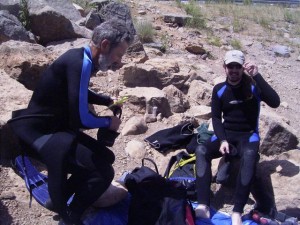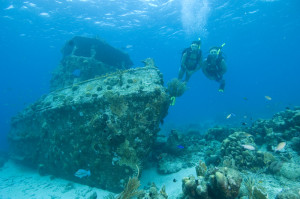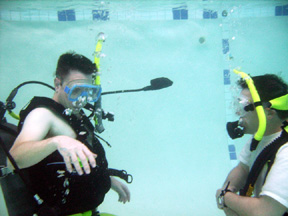Get ready for dive season
So far this month, I’ve talked about diving fitness and how to get to or stay on top of your game. If you’re like many divers, you have a dive season. You’ve probably had a period of non-diving and now you want to get ready, right? Let’s take a look at four things you should do to get ready: Physical fitness, diving skills tune-up, emergency procedures and local orientation with a PADI Pro.
First of all, let’s get back to physical fitness. Being physically fit and getting rid of the extra weight are good for you regardless. For scuba, it’s really important. You’ll be better able to handle your kit and you can probably trim down on how much lead you need in your weight system. On the decompression side of things, fat tissue has been linked to decompression sickness. Reduce the fat, reduce some of the risk.
Next, think about your skills. When were you last diving? When was your last scuba class? Remember, the PADI Open Water Diver course isn’t the end, it’s only the beginning of your education. Taking classes can help you brush up on skills and learn new skills at the same time. If you’re not really interested in more training right now, you should at least consider a Scuba Review or Scuba Tune-Up.
Scuba Review is a short review session with an Instructor, Assistant Instructor or Divemaster. You’ll go over the basic knowledge you learned in Open Water Diver including the dive environment, scuba equipment, dive planning, etc. Then you’ll get in the water to practice skills—the most important part. In the pool, you’ll practice:
- Assembling your kit
- Pre-dive check with your buddy
- Entering the water
- Five point descent
- Mask clearing
- Mask removal and replacement
- Regulator recovery and clear
- Skin diving skills
- Alternate air-source usage & other emergency procedures
Unfortunately, if your initial training wasn’t the best, you might feel a bit uncomfortable with these skills and may not want to do them. Let’s look at why you should be proficient and comfortable with the skills.
Mask skills are important because you’ll probably get some water in your mask for one reason or another. I’ve been diving for well over twenty years and I’ve never had my mask kicked off, so I don’t consider that a reason. I have had to adjust my mask strap underwater, so I had to take my mask off. I’ve also had some photos taken of me without my mask.
What about your regulator? Again, you might need to make an adjustment or you might just want a good picture of your face and not some large piece of plastic or brass.
Emergency procedures are essential to practice and be proficient with. Problems don’t occur often and most can be prevented. But if you couldn’t prevent a problem, being able to respond quickly can prevent a problem from becoming a serious accident. Know where your alternate air source is. Know where your buddy’s alternate is. Know where your buddy is—stay close. Same Day, Same Ocean is not a good buddy procedure. Remember, you’re there to have fun together and help each other out.

These divers are diving in a remote location and should probably have an extended amount of emergency oxygen.
Okay, you’ve gone through a review and you’re ready to dive. Is it a site you’ve been to before and you know? Or, is it a new site? If it’s new to you, consider getting a dive professional to give you a guided tour. They might charge for it, but it’s well worth the money. Having someone show you the best way to enter and exit a dive site can make the difference between a good dive and one that you don’t enjoy. They can also point out the cool things to see while on the dive.
Ready? Go Dive!

